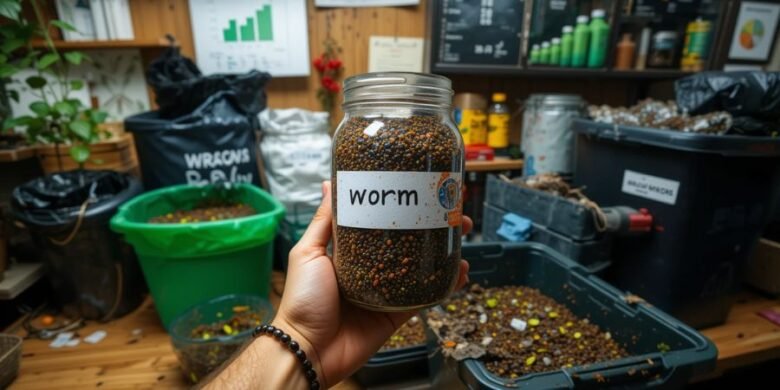In a world increasingly focused on sustainability, worm farming is emerging as not just an environmentally friendly practice but also a lucrative economic opportunity. Whether you’re a home gardener, a small-scale farmer, or an entrepreneur looking for a green business idea, worm farming offers several financial benefits. From reducing costs to creating new income streams, let’s explore how starting a worm farm can make economic sense.
Cost-Saving Benefits of Worm Farming
1. Reduces the Need for Chemical Fertilizers
Worm castings, the byproduct of vermicomposting, are a natural and nutrient-rich alternative to synthetic fertilizers. By producing your own fertilizer, you can save hundreds of dollars annually, especially if you manage a garden or farm.
Example:
A small-scale farm that spends $500 annually on chemical fertilizers can eliminate or significantly reduce that expense by switching to worm castings.
2. Decreases Waste Disposal Costs
For households and businesses, diverting organic waste to a worm bin reduces the volume of trash. This can lead to lower waste disposal fees, especially in areas where waste collection is charged by volume or weight.
3. Lowers Watering Costs
Soils enriched with worm castings retain moisture better, reducing the need for frequent watering. Over time, this can result in substantial savings on water bills.
Revenue Opportunities in Worm Farming
1. Selling Worm Castings
Worm castings are highly sought after by gardeners and organic farmers due to their soil-enhancing properties. You can package and sell them locally or online.
Market Insights:
- A pound of worm castings can sell for $10–$15 depending on quality and location.
- Small-scale operations can generate steady income by catering to local gardening communities.
2. Selling Worms
Red wigglers, the preferred species for vermicomposting, are in high demand among new worm farmers and fishing enthusiasts. Breeding worms and selling them can provide an additional income stream.
Revenue Potential:
- A pound of worms (approximately 1,000 worms) typically sells for $30–$50.
- Worm breeding can be scaled up to meet market demand.
3. Worm Tea Production
Worm tea, a liquid fertilizer made from steeping worm castings in water, is another product that gardeners value. It can be sold in bottles at farmers’ markets or gardening stores.
4. Workshops and Education
As interest in sustainable practices grows, there’s an increasing demand for workshops and training sessions on worm farming. Hosting classes or creating online content can help monetize your expertise.
Scaling Up: Opportunities for Larger Operations
1. Supplying to Organic Farms
Large-scale worm farms can partner with organic farms to supply castings or worms in bulk, establishing long-term contracts and stable revenue streams.
2. Waste Management Services
Businesses like restaurants and grocery stores produce large amounts of organic waste. Worm farming operations can offer waste management services, charging fees for waste collection and processing.
3. Selling to Nurseries
Garden centers and nurseries are ideal customers for worm castings and worm tea. Building relationships with these businesses can create consistent demand.
Real-Life Example: A Success Story
A small-scale worm farmer in California started with a simple backyard setup and gradually expanded into a full-time business. Within two years, they were selling castings, worms, and worm tea to local gardeners and online customers. Today, their business generates over $50,000 annually, proving that worm farming can be both sustainable and profitable.
Tips for Maximizing Economic Benefits
- Start Small: Begin with a small worm bin and scale up as you gain experience.
- Network Locally: Partner with community gardens, schools, and farmers to build a customer base.
- Diversify Products: Offer a mix of castings, worms, and educational services to maximize revenue streams.
- Optimize Operations: Focus on efficient breeding and harvesting techniques to reduce labor costs.
Conclusion
Worm farming is a unique opportunity to align economic goals with environmental responsibility. By reducing expenses, creating valuable products, and tapping into growing markets for sustainable practices, worm farming can be a profitable venture for individuals and businesses alike. Whether you’re looking to save money or start a green business, worm farming is a low-risk, high-reward option that’s worth exploring.




